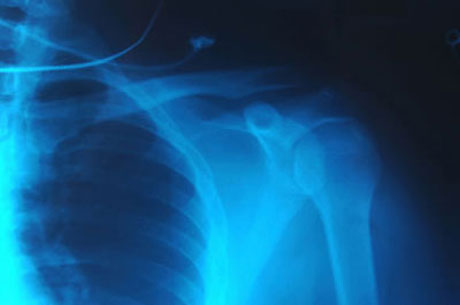(单词翻译:单击)
情景对话
Fred: So, Shibika, we've been talking about your accident and how this has changed your life and how you spent almost a month in bed, so how did that month in bed change your daily routine, like, did you experience any trouble brushing your teeth at night? Was it hard for you to eat? Was it hard for you to go to the bathroom? What? How was that?
弗雷德:史毕卡,我们之前聊了你发生的车祸,还有车祸对你生活的改变以及你怎样在床上度过了一个月的时间,那你卧床休息的那一个月对你的日常生活造成了影响吗?你晚上刷牙时有没有遇到问题?你吃饭和上厕所是不是也很困难?当时的情况怎么样?
Shibika: Right. Every bit of it. Every bit of it changed because, like you use your hands to do everthing, you know, in your daily routine, from sleeping to eating to everything, so basically, yeah, and it was initially it was really frustrating because for everything, even while getting up from bed, to going to the bathroom as you said, or eating by yourself, I needed help. I needed assistance. But then I just tried to do it by myself because it's not like to call my mom, or call somebody for every small pain you know, to help me, so I tried to do it by myself or I used to use my left hand while doing it, so it was interesting, rather and I developed new hobbies because I had to be in bed the whole time so I couldn't really go out so I started reading. I picked up reading.
史毕卡:对。所有事都有问题。一切都改变了,因为像睡觉、吃饭等在日常生活中做的每件事都需要用手,一开始的时候我非常沮丧,如你所说,像起床、睡觉、去卫生间等所有的事情我都不能自己完成,我需要别人的帮助,我需要帮助。不过之后,我开始尝试自己去做所有的事,因为不能因为一点点小痛苦就给妈妈或其他人打电话,让他们来帮助我,所以我尝试自己做所有的事,尝试使用左手,我发现那很有趣,而且我开发了新的兴趣,那段时间我要卧床休息,我不能出门,所以我开始看书。我重新开始了阅读。
Fred: Really, what kind of hobbies?
弗雷德:真的吗,哪种爱好?
Shibika: Yeah, exactly, like reading. I used to read a lot and then I used to play video games a lot. I got really hooked after that, so I used to play video games and watch movies and stuff. Activities that did not require a lot of effort.
史毕卡:就像读书这样的爱好。我以前经常看书,玩游戏。之后我上瘾了,所以开始玩游戏、看电影,做一些不需要太多精力的活动。
Fred: Ok, ok. Wow, that is really great. So, on a daily routine, so for, could you eat your food at the same time, like breakfast, lunch, dinner? Could you eat regular food?
弗雷德:好,哇,那真是不错。那你那段时间的早午晚餐和平常的饮食一样吗?
Shibika: Yeah. I could eat regular food, but I had to eat it from my left hand. I had to brush my teeth from the other hand, and like anything, I couldn't really move one hand completely. It was tied to a sling that was tied across my neck so, I couldn't move that hand at all, and if anything required both my hands, like if I had to wash my face or something I had to ask my mom to do it for me.
史毕卡:一样。我和平常吃的一样,就是我要用左手吃饭。还要用左手刷牙,做所有事都要用平常不用的那只手。医生在我脖子上绕了吊腕带,我的右手完全不能动,所以像洗脸这种需要两只手完成的事情,我就会找我妈妈帮我。
Fred: So how long did it take you to heal?
弗雷德:你用了多长时间痊愈?
Shibika: It took me a month and a half to actually be you know allowed... after a month and a half the plaster was opened and the sling was taken out and then I could actually move the hand. But after that, also the doctor advised me not to pick up any heavy luggage or not to put any strain on the hand.
史毕卡:大概一个半月,一个半月之后拆掉了石膏,解掉了吊腕带,然后我的右手就能动了。不过医生建议我拆掉石膏以后不能提重行李,也不能给右手施加压力。
Fred: So, still today do you still have any constraints from your accident?
弗雷德:那直到今天,那场车祸仍会制约你的活动吗?
Shibika: Not really constraints, but sometimes, like I can not go to the gym and I can't exercise the hands, or sometimes I forget that that hand was injured so I can't really put a lot of weight on that hand still.
史毕卡:不算是制约,就是我不能去健身房,不能做手部锻炼,有时我会忘记我的手受过伤,还会用右手提重东西。
Fred: I'm really glad that you're healthier now and that you can start living your life normally.
弗雷德:我很高兴你现在很健康,你可以开始正常生活了。
Shibika: Thank you, Fred. Thank you, so much.
史毕卡:谢谢你,弗雷德。非常谢谢你。

译文属可可原创,仅供学习交流使用,未经许可请勿转载
重点讲解
重点讲解:
1. by oneself 单独,独立;
例句:John fixed the tape recorderby himself.
约翰靠他自己修理录音机。
2. used to do sth. 过去常常;过去曾;
例句:Weused tohear the train whistle at night.
过去我们常会在晚上听到火车的汽笛声。
3. pick up 获得,学会;
例句:It didn't take me long topick upthe rudiments of the language.
我没有费多少时间就学会了这一语言的初步知识。
4. not at all 一点也不;
例句:I amnot at allsatisfied with this book.
我对这本书一点也不满意。
5. take out 去除;除掉;
例句:I got an abscess so hetookthe toothout.
我牙龈脓肿,所以他就把那颗牙拔掉了。


